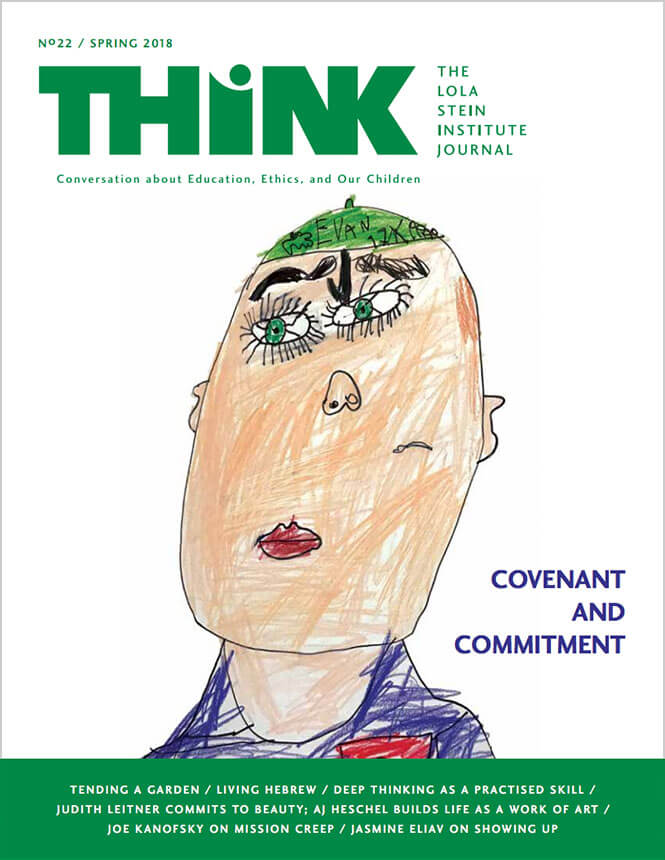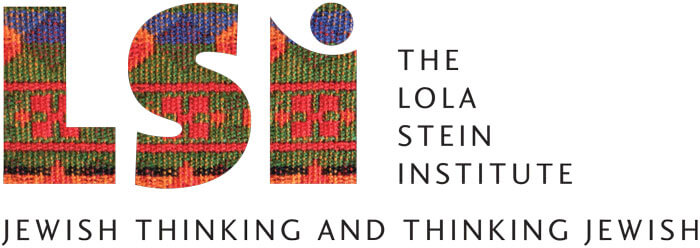- How We Teach

- First Column
- Second Column
- Third Column
- Case Studies

- First Column
- Second Column
- Culture & Community

- First Column
- Second Column
- News & Views

- Admissions

- First Column
- Second Column
- Support Us

- About

- First Column
- Second Column
- Parent Hub
- Attend an Open House
- Take a Tour
- Donate Now
- Calendar
- Blog
- 416-635-1876
- Search
Between Teacher and Student there Is a Dialogical Space
With school children of my own, I am reminded constantly of how important a teacher is in the learning experience of their students. If, as Heschel says, the teacher is the text that students study, what exactly are they reading? What do they take away from interactions with the text (person)? Also, what does the teacher think that they take away? What learning is happening that is unintended?
Researching material for the last issue of THINK magazine, we discovered a groundbreaking possibility for thinking about personal interactions between teachers and students. Professor Mihnea Moldoveanu of the Rotman School of Management at the University of Toronto looks at personal interactions through what he calls the “dialogical space.” Much more than a teacher’s words or the knowledge content of a lesson, the dialogical space encompasses the teacher’s full presence and emotional bearing, oral expression, and body language, what’s happening in the immediate environment, and how the student is responding. The space houses the functioning relationship between teacher and student, the upshot of complex communications that happen all day long. How educationally strategic would it be for teachers to perfect their performance in this dialogical space?
Professor Moldoveanu is the Director of the Desautels Centre for Integrative Thinking and has been working on performance analysis in business, a completely different context than ours. At the Desautels Centre, MBA students and consulting executives are videotaped while they give presentations or lead group meetings. Later, they receive detailed feedback with insight into their performance in the dialogical space. First, a computer evaluates them using sophisticated technology that reads facial expressions and body language, then it tracks the expressions and gestures to a printed text of the presenters’ words and the audience’s response. The combined information is interpreted and shared with the presenters during reflective sessions with specially trained Desautels “feedback-givers.” The process helps the Rotman students and executives improve their performances.
Professor Moldoveanu has done research that demonstrates the critical role ” feedback” plays in learning. He explains that developmental feedback (an evaluative process where learners are helped over time to improve) is more effective than evaluative feedback (a single response that is limited to assessment). This is especially true with interpersonal skill and communication technique which are subtle and hard to measure. As such the feedback sessions are a training process and not a single happening.
In a pilot leadership initiative, the Desautels Centre for Integrative Thinking and The Lola Stein Institute are applying these techniques to elementary and junior high school teachers, and the Desautels Self-Development Laboratory (SDL) is training teachers at The Toronto Heschel School. Heschel teachers will be videotaped in their classrooms; the tapes will be analyzed at Rotman using SOL technology; and Professor Moldoveanu and his staff from the SOL will provide feedback to the teachers over several reflective sessions. We will be documenting the process and examining how studying the dialogical space between teachers and students impacts the learning experience.
This training advances the Heschel teachers’ current reflective practice through scientific analysis. Bringing a camera into the classroom to record the goings-on breaks new ground. While a little challenging for the teachers, its also very exciting. Greg Beiles, Director of The Lola Stein Institute and Head of School at Toronto Heschel, was videotaped in August as he led a professional development workshop in front of his teaching staff. He was evaluated in September. He says that the computer analysis was fascinating and the evaluation made him “reflect on the alignment of his technique and his intention.” It led him to “revisit the teaching intention that he thought he had in place.” The evaluation was concrete and specific and he learned a lot about how he presented to and was received by his audience.
Videotaping offers teachers a mirror onto their own teaching. They can see how, in fact, they are relating to their students as they move about the classroom. They will see for themselves what’s going on. They will watch themselves, and see their students watching them. They’ll find out how the computer reads their expressions and movements: Does this habit add or detract from my teaching? Am I clear? Am I boring? Look how students turn away as I speak in different ways? What is that emotion? Why for that material? What is actually coming across?
Already excitement for the project is palpable. Whether with trepidation or enthusiasm, teachers have scheduled their own learning adventure. Just being tuned into the idea of the dialogical space has created a refreshed sensitivity and self-awareness. The interaction between teachers and students is under the microscope. We will keep you posted.
Dvora Goodman , CoordinatorDvora Goodman is a Jewish educator with over twenty five years of experience in educational administration and Jewish experiential learning in various settings. She is the coordinator of The Lola Stein Institute. She is also an educational consultant to various Jewish educational organizations. Her current projects include UJA Federation of Greater Toronto where she has been coaching supplementary school leaders in the Greater Toronto area, and the iCenter for Israel Education where she has been helping Jewish camps and Jewish day schools infuse Israel into their settings.
PREVIOUS ARTICLE
Commitment to Deep ThinkingNEXT ARTICLE
Living HebrewSpecial Feature
Our Sages Tell Us
Perspectives
 The Lola Stein Institute (LSI) is a centre of inventive educational thinking and addresses the challenge to re-frame schooling for the exigencies of our times.
The Lola Stein Institute (LSI) is a centre of inventive educational thinking and addresses the challenge to re-frame schooling for the exigencies of our times.









